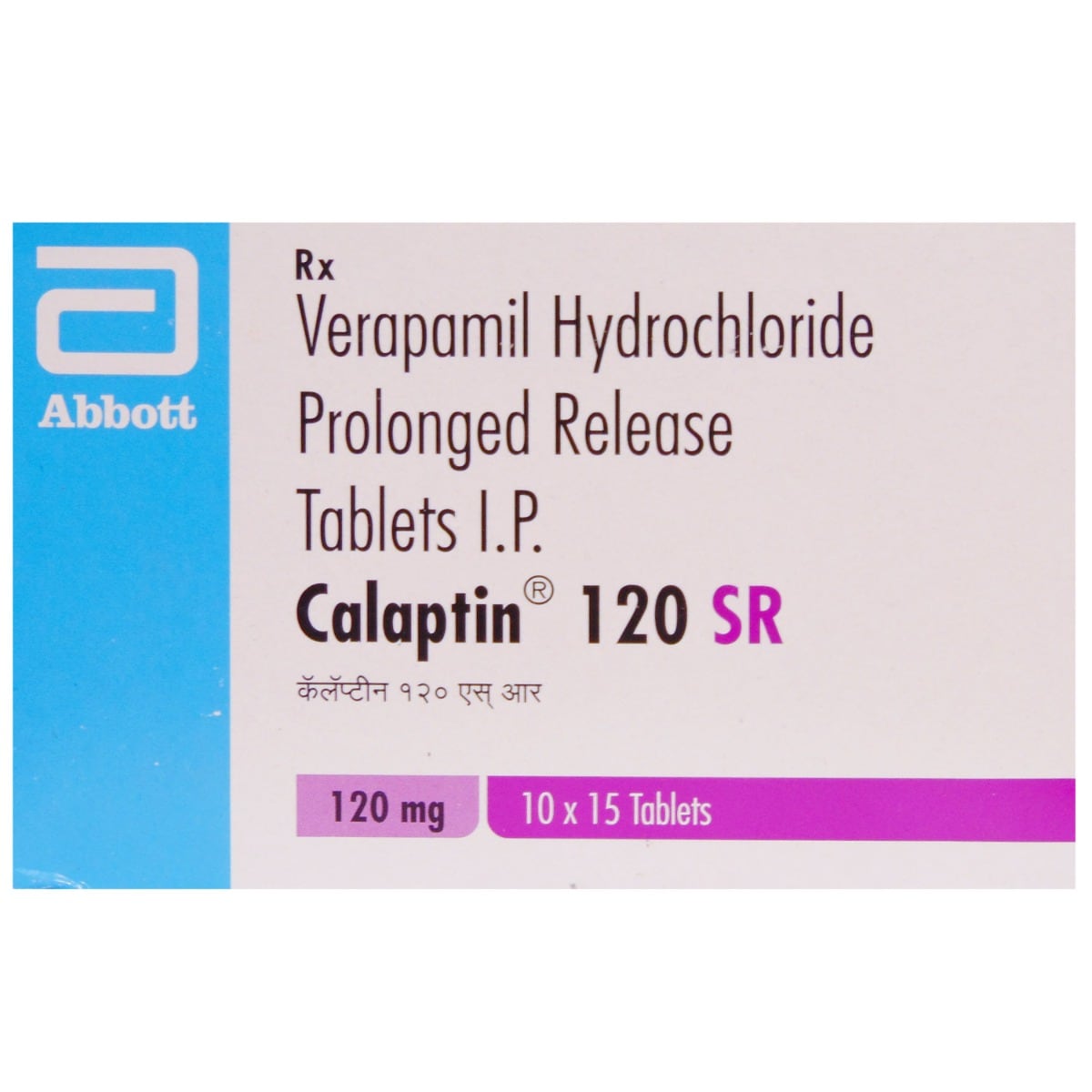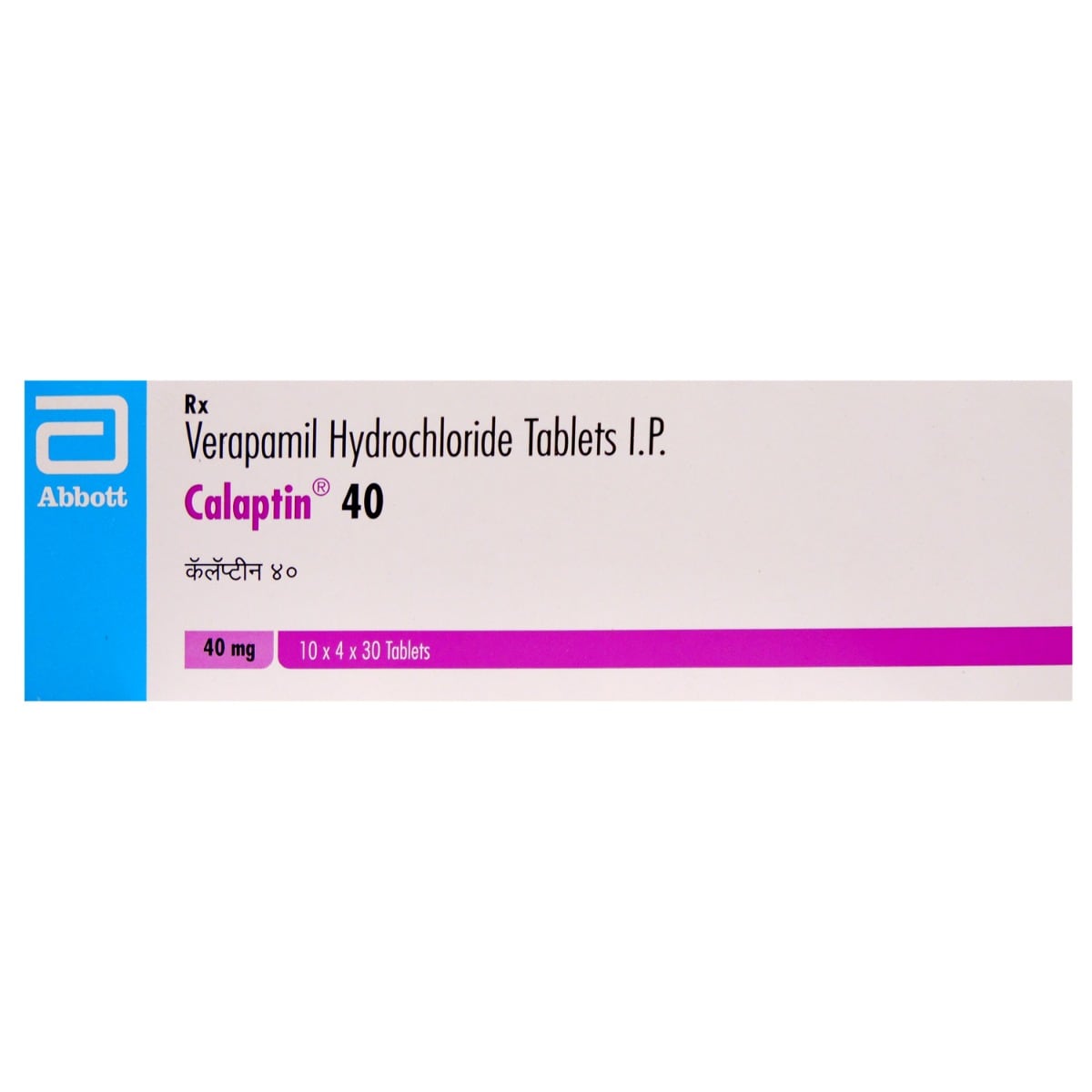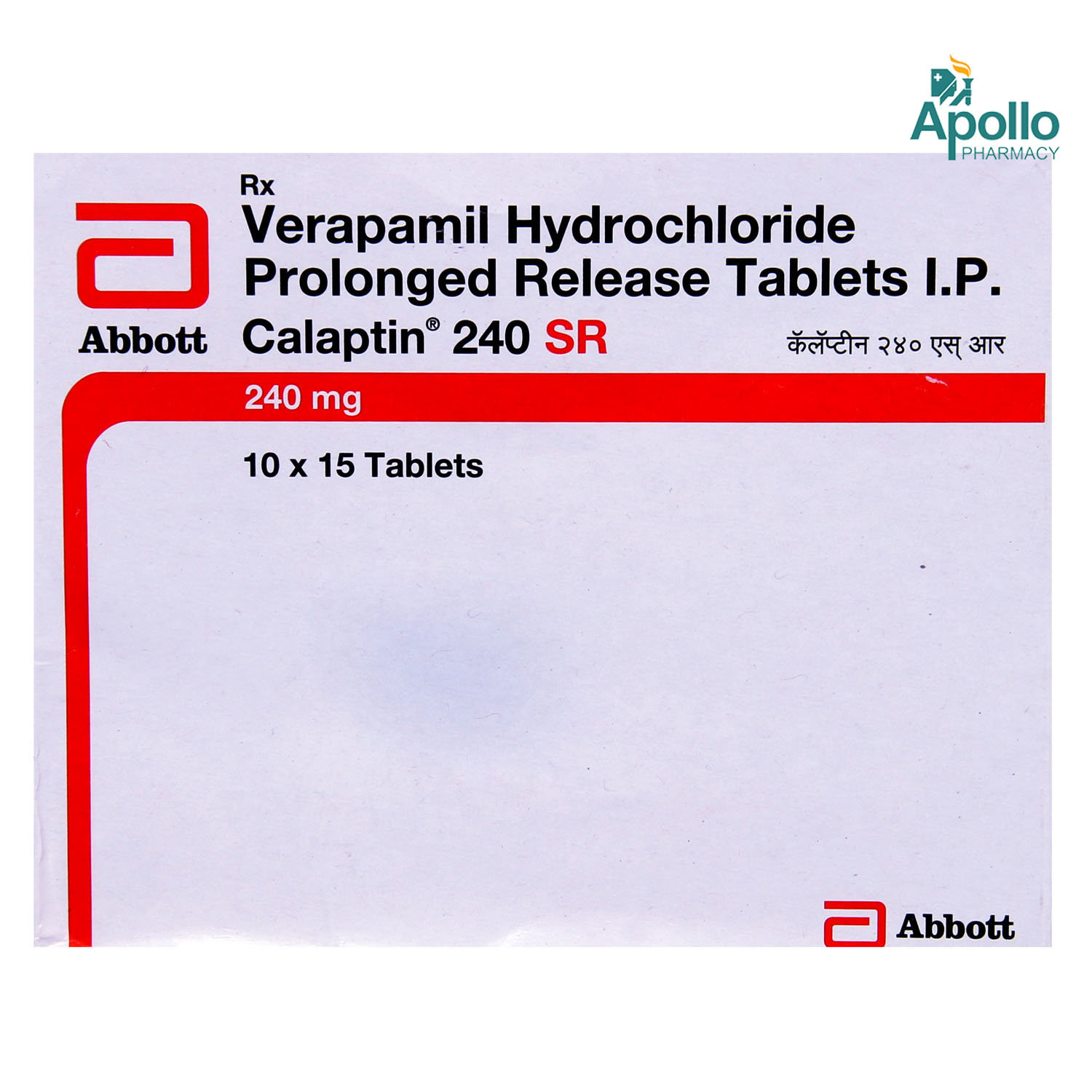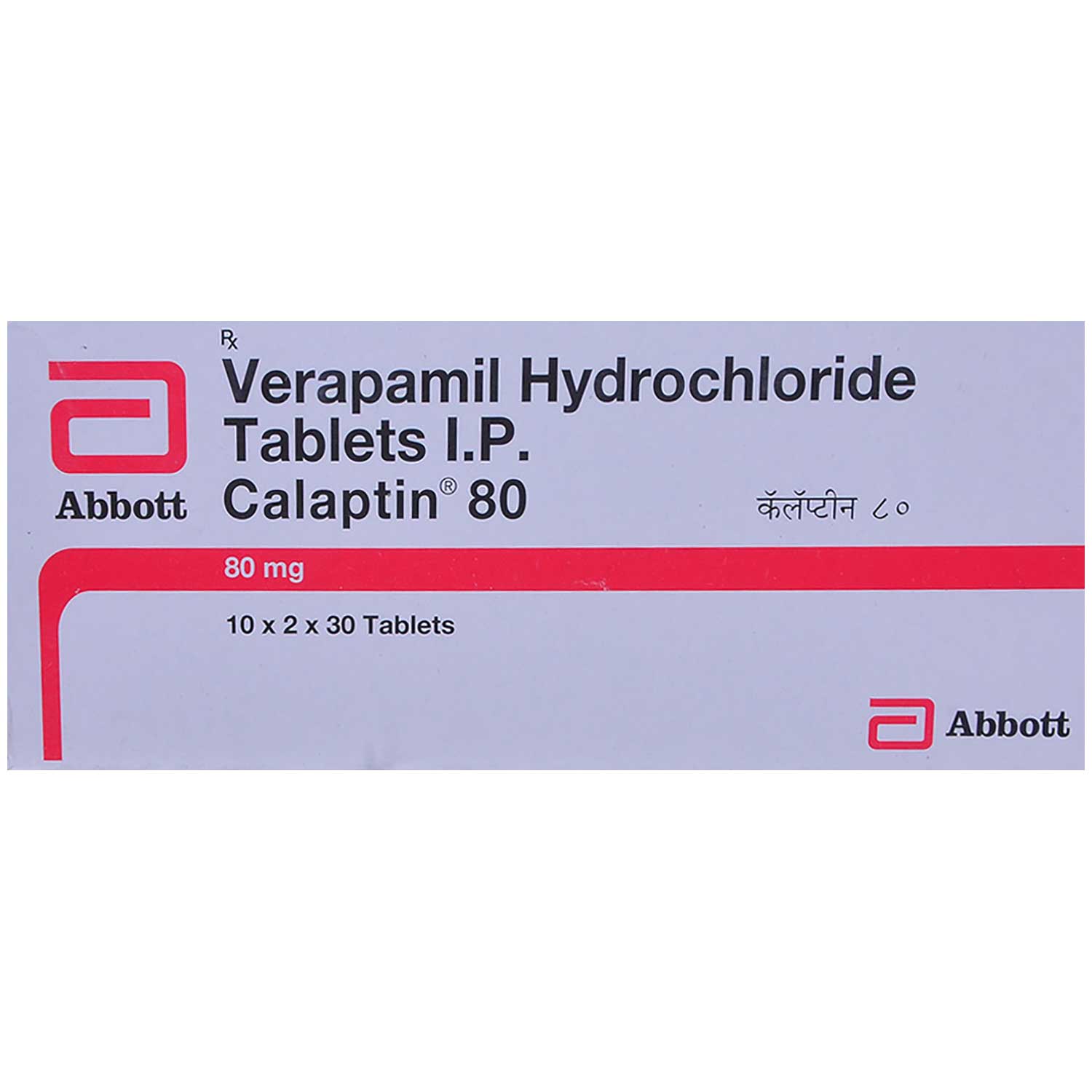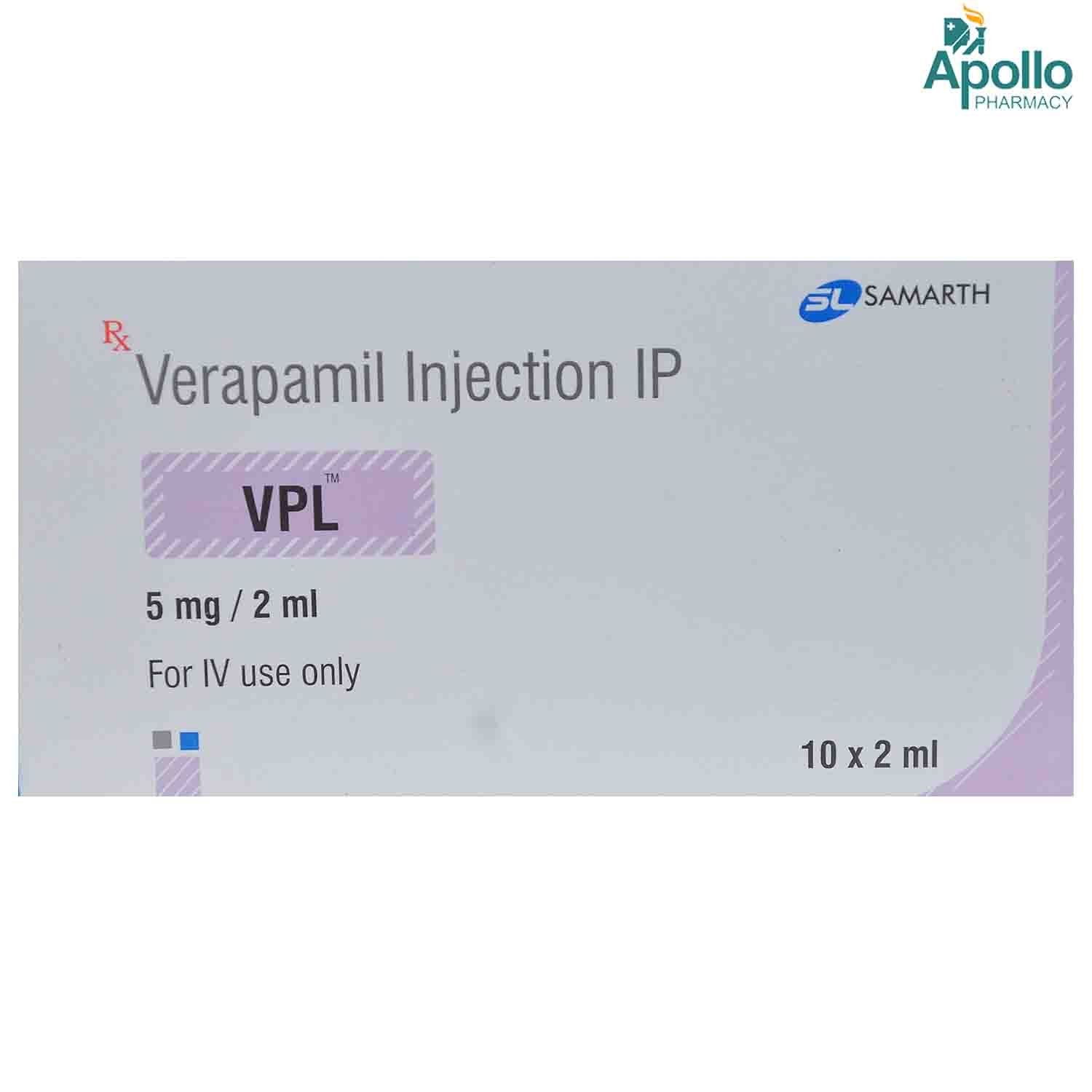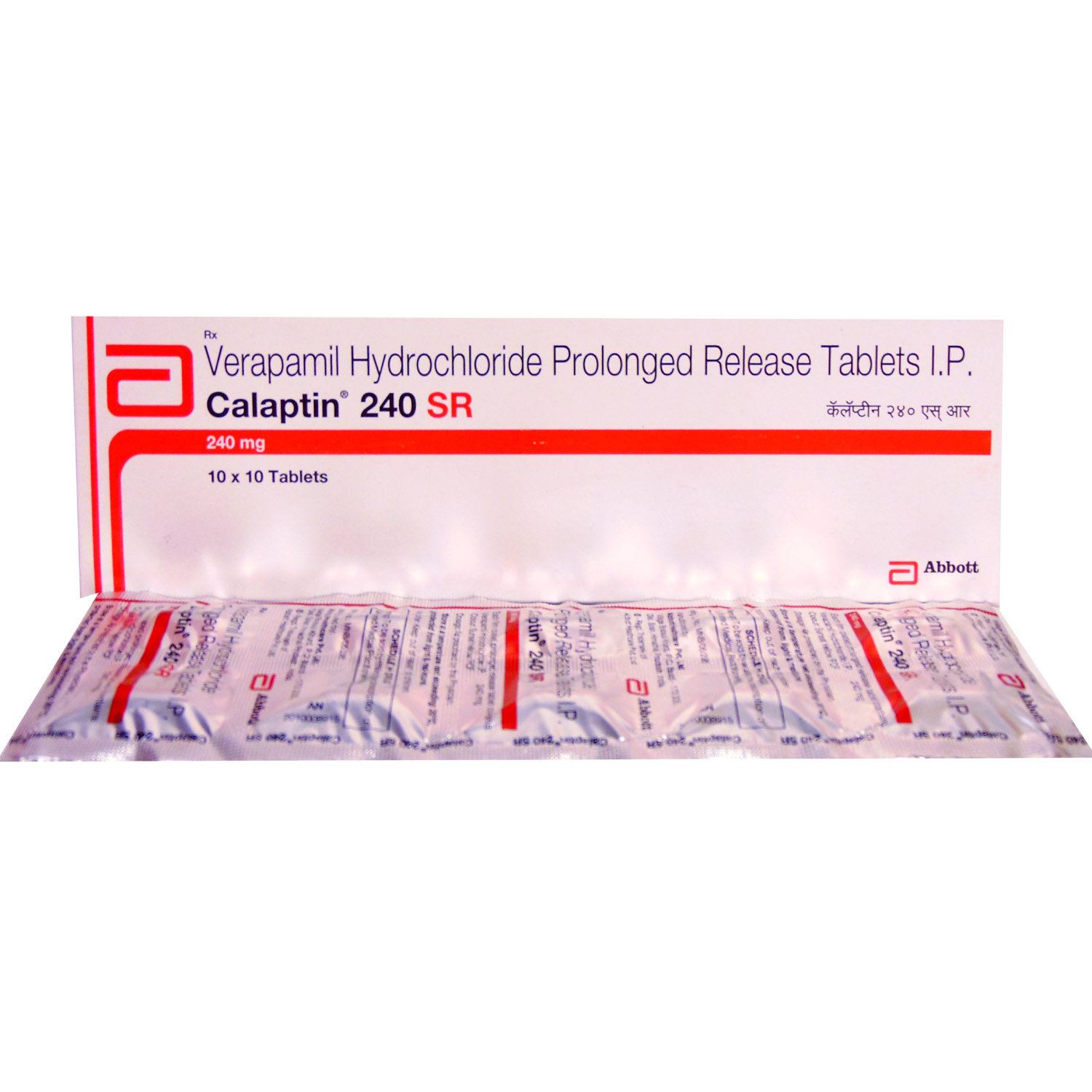Verapamil
About Verapamil
Verapamil is used to treat hypertension (high blood pressure), angina pectoris, and arrhythmias. Hypertension is a condition in which there is a persistent rise in blood pressure levels. Angina pectoris (angina) is chest pain due to reduced blood flow to the heart due to blockage or narrowing of blood vessels supplying the heart. Arrhythmia is a condition in which your heart beats irregularly, too fast or too slow.
Verapamil contains ‘Verapamil’, which belongs to the class of ‘calcium channel blockers. It works by relaxing the blood vessels, decreasing the workload on the heart. It also increases the blood and oxygen supply to the heart, thereby normalizing the electrical impulses. These effects help to reduce blood pressure and also control the rate and rhythm of the heartbeat.
Take Verapamil as prescribed by your doctor. The common side effects of Verapamil are nausea, constipation, headache, dizziness, and low blood pressure. These side effects usually don’t require treatment and gradually resolve over time. However, if these side effects persist or worsen, inform your doctor immediately.
It is not recommended to take Verapamil if you are allergic to Verapamil or any other contents present in it, have heart failure or severe problems with the rhythm of the heart (unless you have a pacemaker), have heart failure and taking beta-blockers, have had a heart attack recently, have a history of bradycardia (slow heart rate) or hypotension (low blood pressure), have Wolff-Parkinson-White syndrome (rapid heart rate associated with dizziness), and have been taking a medicine containing ivabradine for heart diseases. Verapamil should be used with caution in patients with heart attacks and problems with the impulses in the heart, liver, and kidney diseases. Verapamil should be used with caution in pregnant women and is probably safe when used in breastfeeding mothers. Verapamil may increase the amount of alcohol in the body, so limit alcohol consumption. Verapamil may cause dizziness, so do not drive or operate heavy machinery if you feel dizzy.
Uses of Verapamil
Medicinal Benefits
Verapamil contains ‘Verapamil’. It is used to treat high blood pressure. Lowering high blood pressure helps prevent strokes, heart attacks, and kidney problems. Verapamil belongs to a class of drugs known as calcium channel blockers. It works by relaxing blood vessels so blood can flow more easily.
Directions for Use
- Verapamil can be taken with or without food as advised by a doctor.
- Take Verapamil at a fixed time every day for the best results or as advised by a doctor.
- Swallow the tablet as a whole with a glass of water.
- Do not chew, crush, or break it.
Storage
Side Effects of Verapamil
- Nausea
- Constipation
- Headache
- Dizziness
- Low blood pressure
Medicines Containing this Salt
View AllDrug Warnings
Verapamil is not recommended in people using beta blockers as it may cause atrioventricular (AV) block (a type of heart block) and bradycardia (slow heart rate). Verapamil is also not recommended in patients who have heart failure or severe problems with the impulse or rhythm of the heart (unless you have a pacemaker), had a heart attack recently, a history of bradycardia (slow heart rate) or hypotension (low blood pressure), and Wolff-Parkinson-White syndrome (rapid heart rate associated with dizziness). Verapamil contains sunset yellow aluminium lake as a colourant, which may cause allergic reactions in some people. Please do not eat or drink products containing grapefruit as it may increase the effects of Verapamil.
Drug Interactions
Drug-Drug Interactions: Verapamil may interact with medicines used to treat heart diseases (ivabradine and digoxin), medicines used to treat high blood pressure (prazosin), and other antihypertensives such as beta blockers (atenolol, bisoprolol, metoprolol, and propranolol), a medicine used to treat stomach ulcers (cimetidine), medicines used to treat epilepsy (phenobarbital, carbamazepine, and phenytoin), medicines used to treat infections (rifampicin, erythromycin, clarithromycin, and telithromycin), a medicine used to treat HIV (ritonavir), antidepressants (lithium, imipramine, and hypericum perforatum), a medicine used to treat asthma (theophylline), sedative (midazolam), medicines used to lower cholesterol levels (simvastatin and atorvastatin), pain killer (aspirin), medicine used to treat migraine (almotriptan), anticoagulant (dabigatran), medicines used to treat arrhythmias (quinidine and flecainide), medicines used to treat gout (colchicine and sulfinpyrazone), medicine used to treat diabetes (glibenclamide), anticancer agent (doxorubicin), and immunosupressants (ciclosporin, sirolimus, everolimus, and tacrolimus).
Drug-Food Interactions: Do not take grapefruit or juice as it may increase the effects of Verapamil.
Drug-Disease Interactions: Verapamil is not recommended in patients who have heart failure or severe problems with the impulse or rhythm of the heart (unless you have a pacemaker), had a heart attack recently, a history of bradycardia (slow heart rate), or hypotension (low blood pressure), and Wolff-Parkinson-White syndrome (rapid heart rate associated with dizziness). Verapamil should be used with caution in patients with heart attacks and problems with the impulses in the heart, liver, and kidney diseases.
Drug-Drug Interactions Checker List:
Safety Advice

Alcohol
unsafeIt is not recommended to consume alcohol while using Verapamil as it may worsen your condition.

Pregnancy
cautionVerapamil should be used with caution in pregnancy as it may harm your unborn baby. Please consult your doctor before using this medicine.

Breast Feeding
safe if prescribedVerapamil is considered safe to be used in breastfeeding. Your doctor will weigh the benefits and any potential risks before prescribing this medicine. Please consult your doctor.

Driving
cautionVerapamil may cause dizziness, so do not drive or operate heavy machinery if you feel dizzy after taking this medicine.

Liver
cautionVerapamil should be used with caution if you have liver conditions. Your doctor may adjust the dose based on your condition.

Kidney
cautionVerapamil should be used with caution if you have kidney conditions. Your doctor may adjust the dose based on your condition.

Children
cautionVerapamil should be used in children below 12 years only if clinically needed and if the benefits outweigh the risks. It is not recommended for use in young infants.
Habit Forming
Diet & Lifestyle Advise
- Keep your weight under control with BMI (Body Mass Index) 19.5-24.9.
- Do regular physical activity or exercise for at least 150 minutes per week, or about 30 minutes most days of the week. Doing this can help you to lower your raised blood pressure by about 5 mm of Hg.
- Opt for a diet rich in whole grains, fruits, veggies, and low-fat dairy products.
- If you are taking alcohol, then only one serving for women and two servings is advisable.
- Quitting smoking is the best strategy to lower the risk of heart disease.
- Avoid chronic stress, as it can raise your blood pressure. Meditation is suggested.
- Monitor your blood pressure daily and if there is too much fluctuation, immediately contact your doctor.
- Try to include heart-healthy omega-3 fatty acids-containing food drinks in your daily diet. You can also use low-fat cooking oil like olive oil, soybean oil, canola oil, and coconut oil to lower your elevated blood pressure.
Special Advise
- Let your doctor know that you are taking Verapamil if you are scheduled for surgery where an anaesthetic will be used (including dental treatment).
- Verapamil may cause low blood pressure and dizziness, so rise slowly from sitting or lying.
- Please do not stop taking the medication without discussing it with your doctor.
Patients Concern
Disease/Condition Glossary
Hypertension: It is a chronic condition when blood pressure is too high. Blood pressure is the amount of blood pumped by the heart and the amount of resistance exerted by the arteries against the blood flow. If the heart pumps more blood, then arteries become narrower, and in turn, blood pressure becomes high. If blood pressure becomes uncontrolled, it may cause serious heart disease, including stroke and heart attack. High blood pressure also causes brain damage (stroke) and kidney failure. Blood pressure is expressed by systolic and diastolic. Systolic blood pressure represents the contraction and relaxation of the heart. Diastolic represents the pressure in the vessels when the heart beats and is in a resting state. Ideal blood pressure should be between 90/60mmHg and 120/80mmHg. Hypertension is detected when systolic blood pressure is more than 140mmHg, and diastolic pressure is higher than 90mmHg. Some symptoms of hypertension include headache, nose bleeding, vomiting, and chest pain.
Angina pectoris: It is the medical term for heart-related chest pain. It occurs when there is a reduction in blood supply to the heart due to the blockage of one or more arteries (coronary heart disease). Patients with angina often explain chest pain as squeezing, tightening, or pressure in the chest. Other symptoms can be dizziness, sweating, heartburn, and difficulty breathing.
Arrhythmia: Arrhythmia is a condition in which your heart beats irregularly, too fast, or too slow. Symptoms of irregular heartbeat include chest pain, shortness of breath, and fast or slow heartbeat. 60 to 100 beats per minute is generally considered a normal heart rate.
FAQs
Verapamil is used to treat hypertension, angina pectoris, and arrhythmias.
Verapamil contains ‘Verapamil’, which belongs to the class of ‘calcium channel blockers. It works by relaxing the blood vessels making the blood flow easy. It also increases the blood and oxygen supply to the heart. These effects help to reduce blood pressure and also control the rate and rhythm of the heartbeat.
It is not recommended to take Verapamil with other medicines to treat high blood pressure, especially beta-blockers such as atenolol, propranolol, and metoprolol. It may cause an atrioventricular block (a type of heart block) and bradycardia (slow heart rate).
The common side effects of Verapamil are nausea, constipation, headache, dizziness, and low blood pressure. These side effects usually don’t require treatment and gradually resolve over time. However, if these side effects persist or worsen, inform your doctor immediately.
Verapamil should not be taken in people with any degree of heart failure (unless you have a pacemaker), who are taking beta-blockers, who have severe hypotension (low blood pressure), who have severe bradycardia (low heart rate), and Wolff-Parkinson-White syndrome (rapid heart rate associated with dizziness).
To take Verapamil, swallow the medication whole with a glass of water. Do not chew, crush, or break it. Aim to take it at the same time every day to get the best results. Follow the dosage and duration your doctor prescribes, and do not adjust the dose without consulting them. Take Verapamil exactly as your doctor directs to ensure safe and effective treatment.
Verapamil should be used in children below 12 years only if clinically needed and if the benefits outweigh the risks. It is not recommended for use in young infants.
If you're feeling better, don't stop taking the medicine! Instead, report your progress to your doctor and follow their advice. Remember, finishing the full course of medicine is crucial to ensuring your condition is fully gone and doesn't come back. Your doctor will guide you on what to do next, so be sure to check in with them.
Verapamil is a calcium channel blocker used to treat high blood pressure (hypertension), angina (chest pain), and certain heart rhythm disorders. It works by relaxing the blood vessels, decreasing the workload on the heart.
The duration of taking Verapamil varies depending on your specific condition and response to the medication. For chronic conditions such as high blood pressure or angina, Verapamil is typically taken long-term. Your doctor will assess your individual needs and determine the appropriate length of time for you to take Verapamil, ensuring you receive the most effective treatment.
Verapamil is generally considered safe when used as prescribed by a doctor. However, like all medications, it can have side effects and potential interactions with other drugs. It's important to follow your doctor's instructions and inform them of any pre-existing and existing medical conditions or medication history to avoid negative complications.
Yes, Verapamil causes dizziness, which is reported as the most common side effect. Please ensure your safety, exercise caution while driving, and avoid alcohol consumption, as it can worsen the condition. There's no need to panic, as this side effect typically subsides as your body adjusts to the medication over time. However, if the dizziness persists, consult your doctor for personalized guidance and management to address your concerns.
Mild side effects are common and often temporary when taking Verapamil. However, in rare cases, they may become severe due to many factors depending on individuality. Be alert for symptoms like swelling, breathing difficulties, slow heartbeat, fainting, blurred vision, rash, nausea, or extreme tiredness. If you experience any of these side effects worsen, consult your doctor promptly for proper guidance and management.
Verapamil is not suitable for individuals with certain medical conditions. These include severe heart failure, specific heart rhythm disorders like atrial fibrillation, very rapid heartbeats, low blood pressure, cardiogenic shock, sick sinus syndrome without a pacemaker, and second or third-degree heart block without a pacemaker. Additionally, those allergic to Verapamil composition should not take this medication. Consult your doctor to determine whether Verapamil is safe based on your unique health situation and goal.
The symptoms of overdosing Verapamil may include dizziness, blurred vision, slow, fast, or irregular heartbeat, seizures, confusion, difficulty breathing, or swallowing. Take caution while taking the dose to avoid negative symptoms. If any of these symptoms worsen, please contact your doctor immediately.
The most common side effects of the Verapamil are nausea, constipation, headache, dizziness, and low blood pressure. These side effects are usually mild and temporary and resolve as your body adjusts to the medication. However, if any side effects persist or worsen, it's essential to consult your doctor for proper guidance and care.
It's important to consult your doctor before taking Verapamil during pregnancy or while breastfeeding. Verapamil can cross the placenta and be found in small amounts in breast milk, which can have effects on infants. It's crucial to weigh the potential benefits against the risks. Please consult your doctor for proper guidance and care.
Follow a balanced diet, engage in regular physical activity, limit salt intake, maintain a healthy weight, limit alcohol consumption, quit smoking, stay hydrated, and regularly monitor blood pressure.
Before taking Verapamil, it's crucial to consult your doctor and inform them about any pre-existing medical conditions, allergies, and current medications, vitamins, or supplements. This includes heart, liver, and kidney problems, as well as pregnancy or breastfeeding plans. Also, avoid consuming grapefruit or juice and alcohol, as it may interact with Verapamil. Be aware of potential side effects such as dizziness, slow heartbeat, constipation, nausea, headache, or tiredness, and promptly report any severe or persistent symptoms to your doctor. These precautions will ensure safe usage and minimize potential risks associated with Verapamil.

